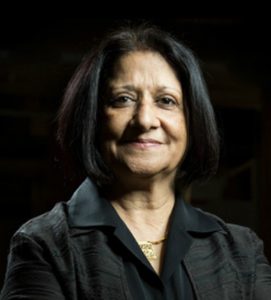Shanaz Dairkee, Ph.D., a senior scientist at Sutter’s California Pacific Medical Center (CPMC) Research Institute in San Francisco has studied breast cancer and its optimal treatments since 1984. This Breast Cancer Awareness Month, Vitals checked in with Dr. Dairkee for her perspective on the importance of biomedical research.

Shanaz Dairkee, Ph.D.
Q: What sparked your interest in pursuing a career in breast cancer research?
A: It started when I attended a seminar as a postdoctoral fellow at UC Berkeley in the mid-1980’s. I stayed back after the lecture that day to meet and applaud the speaker for her passionate plea to promote more and better research for breast cancer patients. For me, that serendipitous meeting with Dr. Helene Smith, the scientific director of a fledgling Cancer Research Institute in Oakland’s Pill Hill neighborhood (where Sutter Alta Bates Summit Medical Center’s Oakland campus is located today), founded with seed funding from UC Berkeley and Peralta Hospital, led to a long-lasting friendship and many exciting and fruitful years of collaborative breast cancer research and discovery.
Q: Why is funding for and awareness of breast cancer research important?
A: The trailblazing ideas proposed by Dr. Smith and her close research collaborators were long-awaited by the clinical community as well as breast cancer patients. Federal agencies, such as the U.S. NIH, were eagerly seeking cutting-edge grant proposals to fund novel translational cancer research models and methods. Leading with a great vision and tireless energy, as the founding director of the Geraldine Brush Cancer Research Institute at CPMC, Dr. Smith successfully spearheaded large federally funded multi-disciplinary and multi-institutional breast cancer research programs in the Bay Area. Our extended collaborative team was instrumental in bridging the gap between laboratory science and clinical application through studies of banked tumor specimens from breast cancer patients. Unique approaches adopted at the time formed the bedrock for the success of technological breakthroughs in immunopathology and cancer genomics that continue at Sutter Health today for many types of cancers.
Q: Breast cancer has become more personal to you. What are you grateful for as you navigate the illness?
A: As I confront my own encounter with breast cancer and hope to be cured, I am greatly indebted to cancer survivors who selflessly donated clinical samples for our laboratory studies over the years, as well as precious time and energy advocating for research funding to continue uninterrupted. I sincerely thank the dedicated clinicians and support staff at Alta Bates Summit involved in my clinical care this October, encompassing many critical steps: mammography, nuclear medicine, diagnostic and molecular pathology, surgery, cancer therapy, physical therapy, integrative interventions, and survivor support. This remarkably well-integrated and seamless hospital experience where the healing hands laid on me transformed me from cancer ‘victim’ to ‘survivor’, will be long remembered and shared often.
In a full circle moment, on the day of my cancer surgery as I exited Alta Bates Summit, I looked down the block toward the site of the Cancer Research Institute where I was first mentored in breast cancer biology almost four decades ago. Coincidentally, it’s where the new Stanford Medicine Sutter Health Cancer Center, currently under construction, will open in a few years. I felt deep gratitude for all the scientific advances made in the field between then and now, and for my personal opportunities to pursue breast cancer research as a Principal Investigator at both institutional affiliations, and at others in between.




